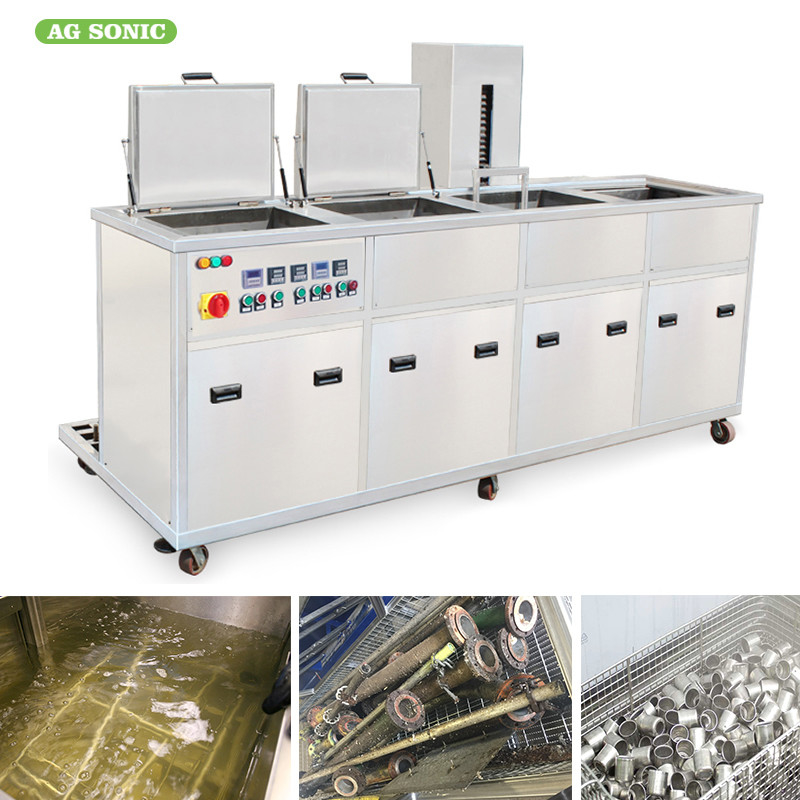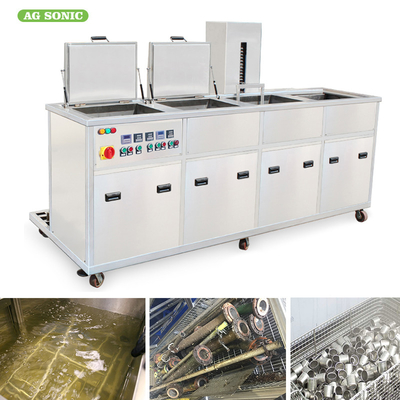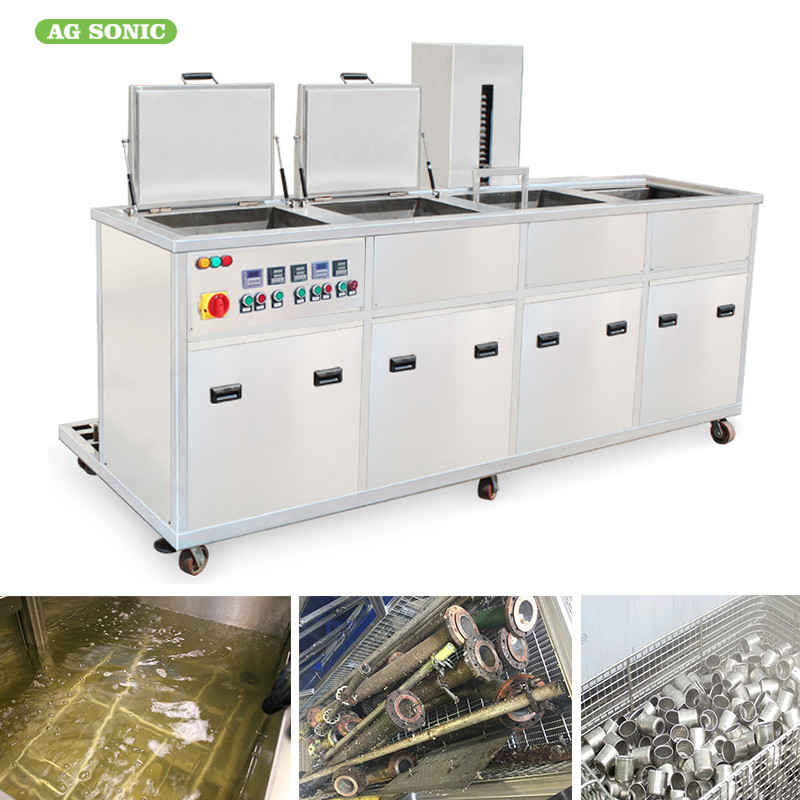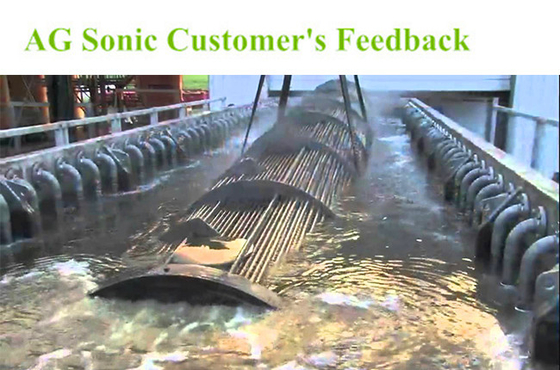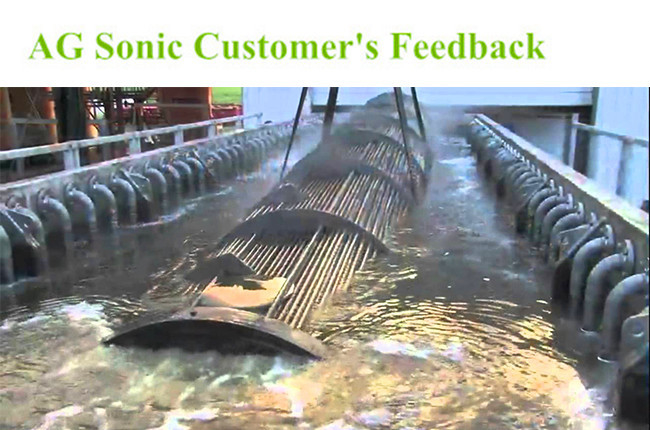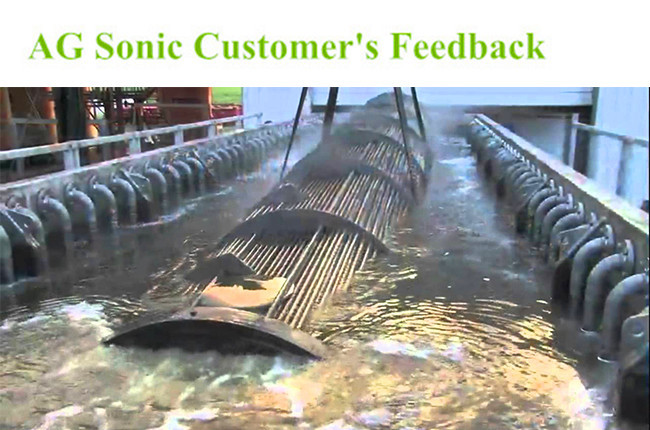Engine Parts Cleaning Machine Cylinder Head Heat Exchanger Ultrasonic Cleaning Machine
Why Ultrasound?
AGSONIC Ultrasonics manufactures large ultrasonic cleaners for the cleaning of heavy and big components with light or heavy contamination. Large tanks are usually required to clean parts such as:
Plastic Injection Molds
Aerospace components
Large batches of smaller parts
Bulk rebuilding of firearms
Heat Exchangers
Engine blocks
It’s efficient, clean, green and cost-effective.
A powerful cleaning solution is now as simple as soap, water and some mighty little bubbles.
Ultrasonic cleaning technology is fast, gentle and extremely powerful. It uses microscopic cavitation bubbles and specially
formulated eco-friendly solutions to search every crease and crevice and eliminate even stubborn or difficult-to-reach contaminants, including grease, dirt, hydrocarbons, metal
shavings, buffing/polishing compounds, carbon deposits, mold release and more.
Radiator Heat Exchanger Industry Ultrasonic Cleaning Machine Oil Filtration Frequency 28Khz / 40Khz
Ultrasonic cleaning has been used industrially for decades, particularly to clean small intricate parts, and to accelerate surface treatment processes. This paper will describe in detail the ultrasonic cleaning process and our experience in developing very large scale equipment and processes capable of rapidly cleaning heat exchangers up to 9.5 m in length and 2m in diameter. In a year of operation, we have encountered heat exchangers fouled with a wide variety of materials from both refinery and chemical clients. Many of the exchangers we were presented with during trials have never been successfully cleaned by any other method. The results of our experiments demonstrate that a combination of ultrasound, with the appropriate chemistry and handling, provides a rapid, safe and environmentally friendly alternative to traditional methods.
Radiator Heat Exchanger Ultrasonic cleaning machines working
Ultrasonic cleaning machines work on the principle of agitating cleaning solvents using high frequency sound waves, the ultrasonic agitation creates millions of microscopic bubbles that implode releasing vast quantities of energy, this action, know as cavitations, dislodges any contaminant stuck to the surface of a part, ultrasonic cavitations thoroughly cleans every surface in contact with the cleaning fluid
Why Use Ultrasonic Cleaner
The current practice involves use of chlorinated solvents like TCE, PCE etc. that are the choice solvent used through the industries in their cleaning process. Aqueous Ultrasonic Cleaning System are very popular due to their good solvency, lower heat of evaporation, high or absence of flash point, non-corrosive nature, relative stability & compatibility with metals & glass. However all chlorinated solvents are hazardous to human health & environment.Some chlorinated solvents are suspected to cause cancer (Carcinogenic) over prolong exposure. Being hazardous to health their usage has come under intense investigation from pollution control & health authorities & has already been banned by developed countries. This has lead to shift to alternative cleaning technology based on aqueous solvents.
ultrasonic tank models Specifications:
Pls find more specifications below:
| Specifications for ultrasonic cleaner T-288S |
| Model |
T-288S |
| Tank capacity |
1800L |
| Tank size |
L150xW150xH80cm |
| Tank material |
2mm SUS304 |
| Ultrasonic power |
14.4KW |
| Heating power |
30KW |
| Timer |
1-99min adjustable |
| Heater |
0-80c adjustable |
| Frequency |
28/40khz |
| Control |
External generator, more stable |
| Optional |
Oil filter system, pneumatic lift, rinsing tank, etc. |
| Voltage |
110V, 1phase; 220V, 3phases/220V, 1phase; 380V, 3phases |
| Warranty |
1 year |
| Packing |
1unit/wooden case |
RFQ:
How do I get the best ultrasonic cleaning?
There are many considerations important to ultrasonic cleaning. Optimising these variables will produce the best cleaning. The most important decisions to be made are choosing the proper cleaning solution, cleaning at the right temperature for the correct amount of time, and choosing the right size and type of ultrasonic cleaner.
Is a special solution required for cleaning?
Soils adhere to the parts... if they didn't, the soil would just fall off the parts! The purpose of the solution is to break the bonds between parts and their soils. Water alone has no cleaning properties. The primary purpose of the ultrasonic activity (cavitation) is to assist the solution in doing its job. An ultrasonic cleaning solution contains various ingredients designed to optimise the ultrasonic cleaning process. For example, increased cavitation levels result from reduced fluid surface tension. An ultrasonic solution will contain a good wetting agent or surfactant.


 Your message must be between 20-3,000 characters!
Your message must be between 20-3,000 characters! Please check your E-mail!
Please check your E-mail!  Your message must be between 20-3,000 characters!
Your message must be between 20-3,000 characters! Please check your E-mail!
Please check your E-mail! 
